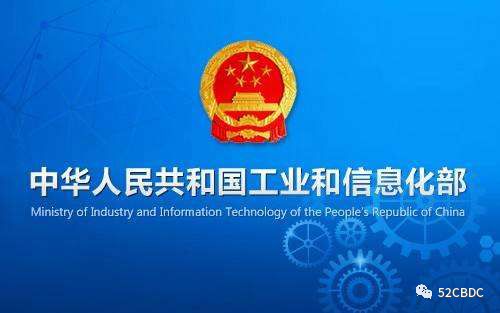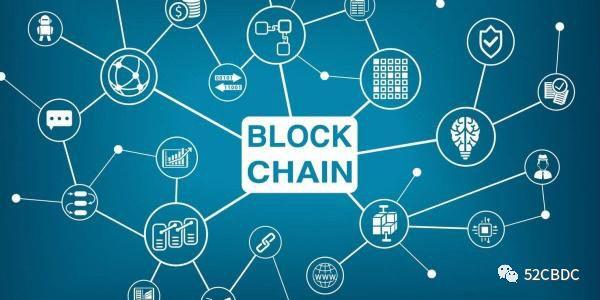Read the overview of China's blockchain policy as of 5 minutes
At present, China has basically formed a preliminary regulatory framework for the blockchain, and is actively promoting the establishment of blockchain technology standards. Trade and industrial Internet have become the key application areas of blockchain technology encouraged by national policies. 52CBDC has a brief review of the current domestic blockchain policy, as follows:

Central Blockchain Policy
On October 18, 2016, the Ministry of Industry and Information Technology released the "China Blockchain Technology and Application Development White Paper (2016)", which summarizes the current status and trends of blockchain development, analyzes core key technologies and typical application scenarios, and proposes China's block Chain technology development roadmap and standardization roadmap.
On December 17, 2016, the State Council issued the "Thirteenth Five-Year Plan" National Informatization Plan, which proposed to strengthen the research and development and cutting-edge layout of the technical foundation of blockchain and other technologies, and to include blockchain technology in the level of national information planning.
- The detailed explanation of the original text of V God: solving the 51% attack problem of the blockchain through the timeliness detector (TD)
- Active change, Libra or USD single anchor
- Lamborghini has a correlation with Bitcoin. Can it predict the price trend?
On May 17, 2017, the Ministry of Industry and Information Technology issued the "Blockchain Reference Architecture", which elaborated the main participants and core functional components of the blockchain through the elaboration of the user view and functional view of the blockchain. The system description The blockchain ecosystem.
On December 12, 2017, the Ministry of Industry and Information Technology issued the "Blockchain Data Format Specification", which stipulates the data structure, data classification and their relationships and data format requirements of data elements related to blockchain technology, for the construction of blockchain systems. Data reference provided. At present, the "China Blockchain Technology and Application Development White Paper", "Blockchain Reference Architecture" and "Blockchain Data Format Specification" have all contributed to international standards as standardized documents.
On March 23, 2018, the Ministry of Industry and Information Technology released the "Key Points of Standardization Work in the Informatization and Software Services Industry in 2018", which for the first time proposed to promote the establishment of the National Blockchain and Distributed Accounting Standardization Committee.
On November 4, 2019, the Ministry of Industry and Information Technology proposed in the “ Key Points of Standardization Work of the Information and Software Services Industry in 2018 '' that it will promote the establishment of a national blockchain and distributed accounting technology standardization committee, systematically promote standard development, and accelerate the development of key urgent needs. Standards, build a standard system, actively connect with ISO, ITU and other international organizations, and actively participate in international standardization work.
As of the beginning of December 2019, a total of more than 40 blockchain-related guidance policies have been issued at the national level. Among them, the State Council and the State Council General Office have issued 13 blockchain-related guidance policies. In 2019, the state continues to increase its support for blockchain technology. The State Council has issued 6 Blockchain-related guidelines and policies covering food safety, digital currency, trade, government administration, and transportation.
In addition to the establishment of blockchain technology standards, the integration of blockchain technology with big data, cloud computing, artificial intelligence and other technologies to solve industry problems has also become the country's key encouragement direction.
Blockchain policies of provinces and cities nationwide

Since October, various regions have issued blockchain policies to encourage the development of blockchain industry policy documents. According to incomplete statistics, at least 17 provinces across the country have successively introduced policies related to blockchain. At the same time, more than ten digits of provincial Party committee secretaries have spoken for the blockchain, and a blockchain learning conference has been held. Among them, the policies of various provinces and cities on encouraging the development of blockchain.
Nearly 70% of the policies encourage the development of blockchain technology. Many regions attach great importance to blockchain technology, take blockchain as one of their future development strategies, and actively deploy and support the development and application of blockchain technology to drive the common development of related industries.
For example, Beijing Zhongguancun Management Committee, Beijing Financial Work Bureau, and Beijing Science and Technology Commission announced in November 2018 that blockchain technology should be included in the scope of Beijing's "financial technology" development plan; Hebei Province issued a document expressing its intention to actively foster development Future industries such as blockchain, the "Outline of Hebei Xiong'an New District Planning" also pointed out the need to clarify the key points of industrial development, advanced layout of blockchain, terahertz, cognitive computing and other technology research and development and testing; Shanxi Province will Emerging software products and services are included in the key investment promotion areas.
From the perspective of policy support, Guangzhou ’s “Chain Ten” version 2.0 and Hainan ’s “Chain Six” led the country, giving blockchain industry parks and enterprises vigorous efforts in terms of talent, technology, capital, infrastructure, and scene applications. Policy support. In addition, local governments such as Xiamen and Chengdu also introduced blockchain-related funding support and subsidy policies after the "10.24 Speech."
In addition to policy encouragement, various regions also encourage the construction of a blockchain-industrial integration, and encourage the application of blockchain technology through the establishment of blockchain laboratories and industrial parks. E.g:
Hangzhou Xixigu encourages the development and application of blockchain technology, and rewards the scientific and technological achievements that have won municipal-level or higher technology awards and implemented transformation in Xihu District. According to the certification, according to the national level of 1 million yuan, provincial 500,000 yuan, and municipal level 20 Ten thousand yuan will be subsidized.
Yangpu District of Shanghai encourages key enterprises to jointly establish institutions with independent legal personality, such as key laboratories and research centers for blockchain technology and industry applications, in conjunction with universities and research institutes, and is open to society. If it is assessed to be national or Shanghai, the district government will give individual institutions special awards up to RMB 6 million and RMB 3 million.
At the level of the blockchain industry, various regions have initiated the establishment of a blockchain industry fund to support the development of blockchain startups. According to statistics from People's Venture Capital, as of December 2018, the scale of the blockchain industry fund established by the government across the country has reached nearly 40 billion yuan.
On the other hand, various regions insist on taking blockchain talents as the center, and provide multi-dimensional support such as policies, funds and venues for blockchain activities, blockchain training, and blockchain talent introduction. By attracting and cultivating more and more High-quality blockchain talents accelerate the development of the local blockchain industry.
Blockchain policy in Hong Kong, Macao and Taiwan
In the global wave of digitalization, countries around the world have been discussing blockchain and digital currency supervision schemes. Unlike the mainland's strong regulation of digital currencies, Hong Kong has gradually become a blockchain and digital currency due to the special nature of its economic and political status. Regulatory test field.
In November 2019, the Hong Kong Securities Regulatory Commission issued a white paper on the supervision of virtual asset trading platforms, which shows that Hong Kong may be a place of policy compliance for domestic and foreign blockchain practitioners.
On November 1, 2018, the Hong Kong Securities Regulatory Commission announced new rules for virtual assets-"Statement on the regulatory framework for management companies, fund distributors and trading platform operators of virtual asset portfolios."
The new regulations mainly involve the supervision of three types of entities: virtual asset portfolio management companies, virtual asset fund distributors, and operators of virtual asset trading platforms (commonly known as cryptocurrency exchanges).
The new rules aim to bring virtual asset investment organizers and virtual asset fund distributors into the supervision of the Securities and Futures Commission. They also set out a conceptual framework for the possible regulation of virtual asset trading platforms and introduce a regulatory sandbox for virtual currency exchanges. Program.
For reprint, please indicate the original article URL (52cbdc.com)
We will continue to update Blocking; if you have any questions or suggestions, please contact us!
Was this article helpful?
93 out of 132 found this helpful
Related articles
- DAO, rises in 2020
- Do you know the 5 important elements of blockchain cross-chain interoperability?
- How much bitcoin has been sucked out of the "black hole"? | Bitcoin Secret History
- Here, the truth is "Voice"
- Pangolin Blockchain Development Model: Suggestions for the Development of China's Blockchain Industry
- Research: Bitcoin Lightning Network becomes more centralized, removing central nodes or causing network crash
- From the governance of Huawei and Haier, consider the form of a blockchain distributed autonomous company





